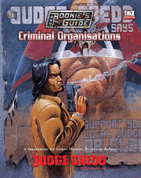
|
About OgreCave and its staff
|

|
by Matthew Pook
One of the more interesting aspects of Mongoose Publishing's Judge Dredd Roleplaying Game is that it lets the players assume the roles of not just Judge characters, but also the citizens residing in Mega-City One. These roles can be developed into that of the criminals, or "perps", that the Justice Department wants to put behind bars (or rather, sentence to time served in the city's many, many iso-cubes). Given the nature of the setting, campaigns can played as one or the other -- they cannot be composed of both Judge and Citizen (or perp) characters. The exception to this is to include members of the Wally Squad, judges trained to operate undercover and to infiltrate the criminal organisations and bring them to justice. To date the supplements for Judge Dredd have concentrated upon campaigns composed entirely of Judges, which is fair enough given that this is also the focus of the comic strip in both 2000 AD and the Judge Dredd Megazine. The first RPG product to deviate from this was The Rookie's Guide to Block Wars, but as with The Rookie's Guide to Criminal Organisations, the GM is allowed to approach their subject matter in two ways. Block Wars is used to generate and handle the conflicts that erupt between the giant housing blocks (in which citizens can spend their whole lives), and the GM can run games that focus upon the participants or can set them up to create situations for player judges to deal with. Criminal Organisations does the same thing, allowing players to create and run their own criminal organisations or the GM to create them for the judge characters to investigate.
Into the Underworld Player characters wanting to establish their own criminal organisation need to be of at least twelfth level, at which point they can take the Advanced Leadership Feat which enables them to run more than just the single business. Prior to that, characters can really only organise and run just the one business behind a front, but with experience they can gain this new feat and set up more to establish a budding criminal empire. Essentially, the larger the front business, the greater the number of activities that can be carried out behind it, hopefully safe from the eyes of the law. The GM is taken through the process step by step, from establishing the front company and the activities it hides, to recruiting staff for the front and crooks for the illegalities. The in-game process can be expensive, especially if the potential criminal mastermind wants to recruit experienced perps. A "business" is defined by several factors: Visibility to the outside world; its level of Activity; the Loyalty of its staff; Reputation; Territory; Income; and Resources and Allies. These provide the numbers for use in running the organisation from month to month. Essentially, the players (or GM if it's an NPC gang) run their organisation through a set number of steps to determine its current status. The checklist includes rolling for casualties, Loyalty, Visibility, Activity, and Task Resolution. These Tasks vary depending upon the decisions made at the beginning of each month for each of the arms of the organisation. They may be as basic as Attack or Defense, Business As Usual, Contraction or Expansion, or alternatively involve Special Operations. These Special Ops include having assassins do a hit on a rival, smuggling on-the-run crooks away from the city, selling those same crooks into slavery, or fixing the odds at the illegal casino. Once these are resolved, income is calculated for all the organisation's activities, and the Loyalty, Activity and Visibility factors are recalculated, before experience is awarded and more members can be recruited. Essentially, this is a set of mechanics for running a meta-game, from which can be derived events to roleplay through. They require relatively little effort and bookkeeping, but do provide a framework onto which a criminally orientated game can be worked. They are coupled with the rules for Reputation, which will hopefully grow among the criminal underworld rather than reach the ears of the Justice Department. With slight adjustment, the system could be used in other d20 system settings, but is naturally most effective in The Judge Dredd Roleplaying Game.
Giving Character to Scum There are no new skills included in The Rookie's Guide to Criminal Organisations, but many existing ones from the Player's Handbook and The Judge Dredd Roleplaying Game are revisited and given one or more alternative uses for any type of character. Thus, the Appraise skill now includes Detect Forgery and Item History, Computer Use covers Encrypt, Decipher and Data Retrieval, and so on. Sense Motive allows Read Profession, the ability to determine another's occupation through the observation of their physical and social traits. How very Sherlock Holmes! The Craze skill includes more of Mega-City One's mad fads such as Bingo, Paragliding, Prank Vid-calling, Pyromania, Semi-Pro Pin-Boing¨ and Shuggy -- a game that's almost, but not quite unlike pool or snooker. The book is rounded out with sixteen scenario hooks and ideas, which can be used within a GM's campaign or at least provide some inspiration. The final five pages are given over to reprinting the tables from throughout the supplement, which although intended to ease the use of its material, does seem unnecessary considering the apparent slimness of the book. Perhaps the space could have included alternative material, such as examples of various gangs and organisations, possibly taken from Sector 190, the Sector House for described in The Rookie's Guide to the Justice Department.
Conclusions
|
||
 Title: The Rookie's Guide to Criminal Organisations
Title: The Rookie's Guide to Criminal Organisations